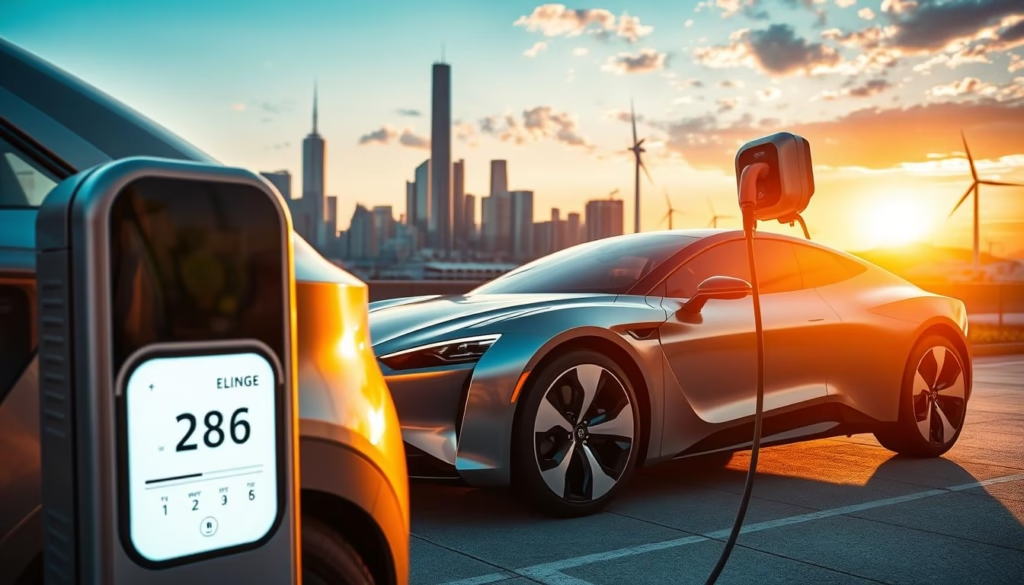You’re thinking about changing how you get around, and electric cars are a good choice among eco-friendly options.
We need cars that are good for the planet. With climate change in mind, more people want sustainable transportation.
Key Takeaways
Electric cars offer a sustainable alternative to traditional vehicles.
Eco-friendly cars are becoming increasingly popular due to their environmental benefits.
The future of transportation is likely to be dominated by electric vehicles.
Government policies are supporting the adoption of eco-friendly cars.
Technological advancements are improving the efficiency and range of these vehicles.
The Rise of Electric Cars in the Market
As we move towards greener ways to travel, these vehicles are becoming more popular. This change is due to several important reasons. These reasons make electric vehicles (EVs) more attractive to people.
Increasing Consumer Demand
More people want cleaner cars because they care about the environment. Electric vehicles are a cleaner choice than traditional cars. They help cut down on pollution and greenhouse gases in cities.
-
More people are aware of climate change and its effects.
-
They want to use less fossil fuel.
-
Government support and incentives help people choose EVs.
Technological Advancements
New tech in batteries has made these vehicles better. Now, they can go further on one charge. This makes them good for daily driving and long trips.
-
Better batteries, like lithium-ion ones, are available.
-
There are more fast-charging spots.
-
Cars are designed to be more efficient.
Government Incentives
Government help is key in getting more people to use these cars. Many places offer tax breaks, rebates, and fee exemptions for buyers.
-
There are tax credits for buying these vehicles.
-
Rebates for home charging stations.
-
They get free passes on tolls and parking.
These reasons together are making these cars more popular. They are becoming a good choice for people everywhere.
Key Benefits of Electric Cars
Electric vehicles are gaining popularity fast. It’s key to know their benefits. This knowledge helps you decide if an electric car is right for you.
Environmental Impact
These vehicles are great for the environment. They don’t have tailpipe emissions, unlike gas cars. This means less air pollution and greenhouse gases.
By choosing an electric car, you help make our air cleaner. You also fight climate change.
Key Environmental Benefits:
-
Zero tailpipe emissions
-
Reduced greenhouse gas emissions
-
Lower carbon footprint
Cost Savings on Fuel and Maintenance
Electric vehicles save money on fuel and upkeep. Electricity is often cheaper than gas. They also need less maintenance because they have fewer parts.
| Cost Category | Electric Cars | Gasoline-Powered Cars |
|---|---|---|
| Fuel Costs (annual) | $500 | $1,500 |
| Maintenance Costs (annual) | $300 | $1,000 |
These vehicles save you money on fuel and maintenance. This makes them a smart choice for your wallet.
Enhanced Driving Experience
They offer a better driving experience. They are smooth and quiet, thanks to their electric motors. They also accelerate quickly, making driving fun.

The number of electric car charging stations is growing. This means less worry about running out of charge. Many electric cars can go over 300 miles on one charge. This makes long trips easier.
Overcoming Common Misconceptions About Electric Cars
Electric cars have gained popularity, but myths still surround them. Understanding the truth can help you make an informed decision before buying an EV.
Range Anxiety: Is It Still a Problem?
One major concern with electric cars is range anxiety—the fear of running out of battery. Today’s models typically offer 200 to 300 miles per charge, and some go beyond 500 miles.
Thanks to advanced battery technology and built-in trip planners, modern EVs make long-distance travel easier than ever.
Growing Charging Infrastructure
Public charging stations for electric cars are expanding rapidly. They’re now found in malls, offices, highways, and urban centers. Governments and private companies are investing heavily in EV infrastructure.
Home charging solutions also make daily use more convenient, letting you charge your vehicle overnight.
Electric Cars vs. Gas Vehicles: Performance & Cost
EVs deliver instant torque, silent acceleration, and fewer moving parts—resulting in lower maintenance. While some models cost more upfront, owners often save over time on fuel and repairs.
Consider total cost of ownership, including tax credits, rebates, and fuel savings when comparing electric vehicles to gas-powered options.
Future of EVs: Innovation and Technology
The EV industry is evolving quickly with smart features, AI, and sustainable energy integration.
Autonomous Driving
Self-driving features are improving rapidly. New electric vehicles use AI to support safer, more efficient driving experiences.
Better Battery Life and Fast Charging
Innovations in battery chemistry promise faster charging and longer life. These updates will make EVs even more practical for everyday drivers.
Sustainable Energy Integration
EVs are increasingly compatible with renewable energy systems like solar and wind. This enables eco-conscious drivers to power their vehicles with clean energy and reduce their carbon footprint.
FAQ: Electric Cars in 2025
What are the main benefits of electric cars?
They reduce emissions, lower fuel costs, offer a smoother drive, and may qualify for tax incentives.
How far can an electric vehicle travel on one charge?
Most EVs in 2025 offer 200–300 miles, with some high-end models exceeding 500 miles.
Where can I charge my electric car?
At home with a wall charger or at public charging stations available in many cities and highways.
How long does charging take?
Level 1: up to 24 hours; Level 2: 4–8 hours; DC Fast Charging: ~30 minutes to 80%.
Are electric cars more expensive?
Some models are pricier upfront, but incentives and long-term savings make them cost-effective.
Which brands offer eco-friendly EVs?
Tesla, Nissan, Ford, Hyundai, and Chevrolet are among the top automakers offering zero-emission vehicles.
What incentives are available in 2025?
Federal tax credits, local rebates, toll exemptions, and utility discounts. Check official sites for updated offers.